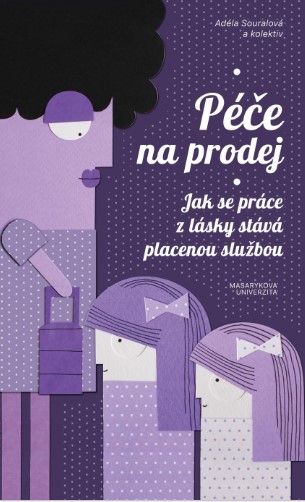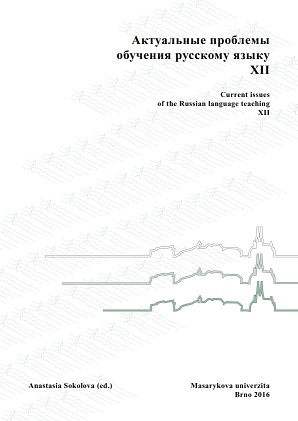


Keywords: Legal provisions; Constitution Law; Criminal Law; Czech Republic; Telecommunications data;
More...
Keywords: Scholarly work; care market; Sociology;
Přestože naše kniha není zacílena výhradně na badatele a badatelky v sociálních vědách, považujeme za důležité představit základní koncepty, teorie a přístupy rozvíjené současnými (především zahraničními) výzkumníky a výzkumnicemi. Tuto kapitolu tak nemusí číst všichni – bez znalosti informací, které zde zprostředkováváme, se při čtení dalších kapitol určitě obejdete. I když naším hlavním cílem je poukázat na společné rysy vybraných institucí, v této kapitole se kvůli diverzitě a širokému záběru knihy nevyhneme určité fragmentaci.
More...
Keywords: Childcare agencies; Babysitting agencies; professional screening; care contract;
„Za každým skvělým mužem stojí dobrá žena, za každou skvělou ženou stojí dobrá chůva,“ napsala v roce 2003 Susan Cheever ve svém eseji o chůvách a jejich najímání ve Spojených státech (2003: 31). Autorka tímto postřehem vcelku trefně shrnuje současná dilemata mnohých českých rodin.
More...
Keywords: Education system; Family; Private Kindergarten;
Péče o děti do tří let je v českém prostředí velmi živé téma. Vzbuzuje vášnivé debaty nejen o tom, nakolik by se v této problematice měl angažovat stát, ale i o tom, jak by péče o nejmenší děti měla vypadat. Zatímco předchozí kapitola se soustředila na individuální placenou péči o děti, tato kapitola poskytuje vhled do problematiky placené péče o děti do tří let v kolektivu, kterou poskytují soukromá nestátní zařízení.
More...
Keywords: paid care; eldercare agencies; family caregivers;
„Zvednout a umýt ležícího manžela, nakrmit nesamostatnou maminku, sedět u postele starého člověka a tišit jeho bolest a zoufalství noc za nocí, na takovou práci ani státní ani komunitní sféra svými silami nestačí,“ píše Hynek Jeřábek (2013: 49) ve své knize Mezigenerační solidarita v péči o seniory.
More...
Keywords: Domestic work; qualification and skills; household cleaning;
Spolu s rozvojem tržního prostředí se proměňuje i přístup k úklidu v domácnosti. Nelze říci, že by se nabídka úklidu domácnosti na trhu dříve neobjevovala. Mít služebnictvo či hospodyni bylo ovšem znakem blahobytu nejvyšších vrstev (Fialová 2004), kdežto zbytek společnosti se musel o úklid postarat v rámci rodinných vazeb – z lásky a zdarma. Mít hospodyni či paní na úklid dnes už ale neznamená selhání či ostudu a ani to nutně neznačí příslušnost k nejvyšší vrstvě.
More...
Keywords: Small repairs around the house; Broken Households;
Těchto pár vět pochází z reklamního textu jednoho hobby marketu prodávajícího veškeré předměty, které člověk potřebuje, aby se mohl pustit do díla. Koupíte zde všechno – od hřebíků přes plovoucí podlahu až po umyvadlo. Reklama hobby marketů také deklaruje, že školený personál každému ochotně – a zdarma – poradí. Hobby markety nám tedy dodají jakékoli potřebné zboží a pomohou i slovem.
More...
Keywords: Dog Hotels; pets; dog kindergartens; dogs in society; families;
Pes je asi nejoblíbenějším zvířetem, které člověk chová jako domácího mazlíčka. Ze zvířete, které bylo člověku užitečným pomocníkem v různých činnostech, se stává součástí rodiny. Lidé si k němu vytvářejí silné pouto a někdy ho považují za sobě rovného. Pes v některých rodinách může nahrazovat dítě nebo věrného přítele a stát se dalším členem rodiny.
More...
Keywords: marketization of care; paid care work; care agencies;
Mysleli jste si celý svůj život, že čas se nedá koupit? Pokud ano, tak vězte, že jste se mýlili. Čas si totiž můžete dost dobře koupit tím, že se vykoupíte z vykonávání určitých činností. Nemusíte být nějaký čas se svým dítětem, nemusíte chodit se svou babičkou k lékaři, nemusíte umývat okna, nemusíte vrtat poličku, nemusíte venčit svého psa.
More...



Keywords: Russian as a foreign language; the standards for Russian as a foreign language; level of language proficiency; lexical competence; phraseological units; phraseological minimum; set expressions;
The Russian testing system of Russian as a foreign language (RFL) is successfully operating for two decades. However, the levels of Russian language proficiency are still not described with sufficient completeness and validity. In the article the problem of reflection in the regulations of lexical competence, which is a system consisting of several components, is considered. One of the most important components are the idioms and set expressions. To form a tiered phraseological minimum is the most important task of the RFL specialists. This work proposes solutions to some theoretical and practical problems in the determining the scope and content of the phraseological lows.
More...
Keywords: bilingualism; problem of bilingualism; Unified National Exam; grammar mistakes; speech mistakes; Russian as non-mother tongue; language competency;
In many regions of the Russian Federation as well as in the Republic of Tatarstan we can witness the situation when the education is conducted using one language and at home the communication is performed using another language. Bilingualism in modern Russia is a wide spread phenomena. Bilingual people are people who can communicate in two or more languages in different environments both monolingual and bilingual in accordance with their sociocultural needs. Bilinguality is closely connected with the phenomena of double nature of cultural sensitivity. Peculiarities of the second language education have always been a topic of deep interest for a lot of scientists. Therefore a special branch closely connected to psycholinguistics appeared. The following article studies the questions connected with the problems which arise when bilingual students take Unified National Exam in the Russian language. The exam checks the following competencies of students: linguistic proficiency (system of the language, main language terms), language proficiency (main language rules), communicative proficiency (speech skills). Experience has proven that bilingual students show lack of such competencies. The research gives classification of the most wide spread mistakes students make when Russian is not their mother language. The basis for the research is represented by the written works of the students whose native language is Tartar. We analyze test tasks (with the possibility to choose the answer), compositions where students were supposed to show their skill to point out one of the problems mentioned by the author in the source text, to comment on this problem, to formulate the author’s position, to express their own point of view, to give arguments on their point of view and to make conclusions. We use method of comparative analysis of unrelated languages. Special attention is paid to the peculiarities of bilingual children teaching in the Russian environment. We have pointed out several recommendations for teaching of the Russian language in bilingual classes aiming to eliminate the mistakes pointed out in the article.
More...
Keywords: Internet; digital natives; digital immigrants; social media; project method; individualization in language learning;
Nowadays students are digital natives. It means that they can’t imagine working, learning and living in a society without Internet. Modern teachers should meet student’s expectations and give them possibility to develop foreign languages by using internet and mobile technologies. This article deals with the topic of using Internet in teaching Russian as foreign language. There are presented internet resources and ways how to use them during the classes and in the self-work with the language. The given examples of working with internet can be useful in teaching students of Russian philology, students of other faculties learning Russian as foreign language and students at language courses.
More...
Keywords: communicative method; teaching of Russian language; principles of choosing the proper method of teaching;
The thesis calls into question the blasted preference of the communicative method in teaching Russian as a foreign language. The thesis suggests that the goals of the teaching should be taken as the basic touchstone while searching for a applicable method of teaching.
More...
Keywords: speech situation; the development of connected speech; situational exercises; cognitive activity; speech culture;
One of the important questions in this article discusses one of the most important issues of modern linguistics - the role and place of speech exercises, which contribute to the development of connected speech of students. Particular attention is given to situational exercises for the development of connected speech, which are constructed using the activation of cognitive activity. Article includes the examples of speech exercises prepared for foreign students who have good knowledge of closely related languages (Ukrainian). These exercises can be used while teaching the course «Culture of Russian language» for students of philology specialty "Russian language and literature" in pedagogical high school.
More...
Keywords: lexical meaning; lexis olfactory perception; national and cultural component; internet discourse;
Article analyzes different ways of describing the area of a country / city through the prism of olfactory perception in online discourse. This study is an attempt to describe the specifics of the national-cultural identity odourative signs, securing stable olfactory associations for this or that object actually developing in a cultural stereotype. On the internet travelogues material of texts identified frequency metaphorical images based on combination of olfactory perception in the minds of existing and impressions of various countries / cities. Identified metaphor model reflect the particular situation of linguistic coding olfactory perception, acting as culturally significant landmarks.
More...
Keywords: text; russian language; linguoculturology; communication; culture; society;
Thе study investigates problematic of research the text from a linguaculturology point of view. We highlighted an important role of linguaculturology method in the analysis of the current texts, accentuate importance of the linguistic and culturogical competence of foreign languages students, Russian language as well. We characterize text as an object of linguaculturology research. Balance with modern IT within the work with foreign language text.
More...